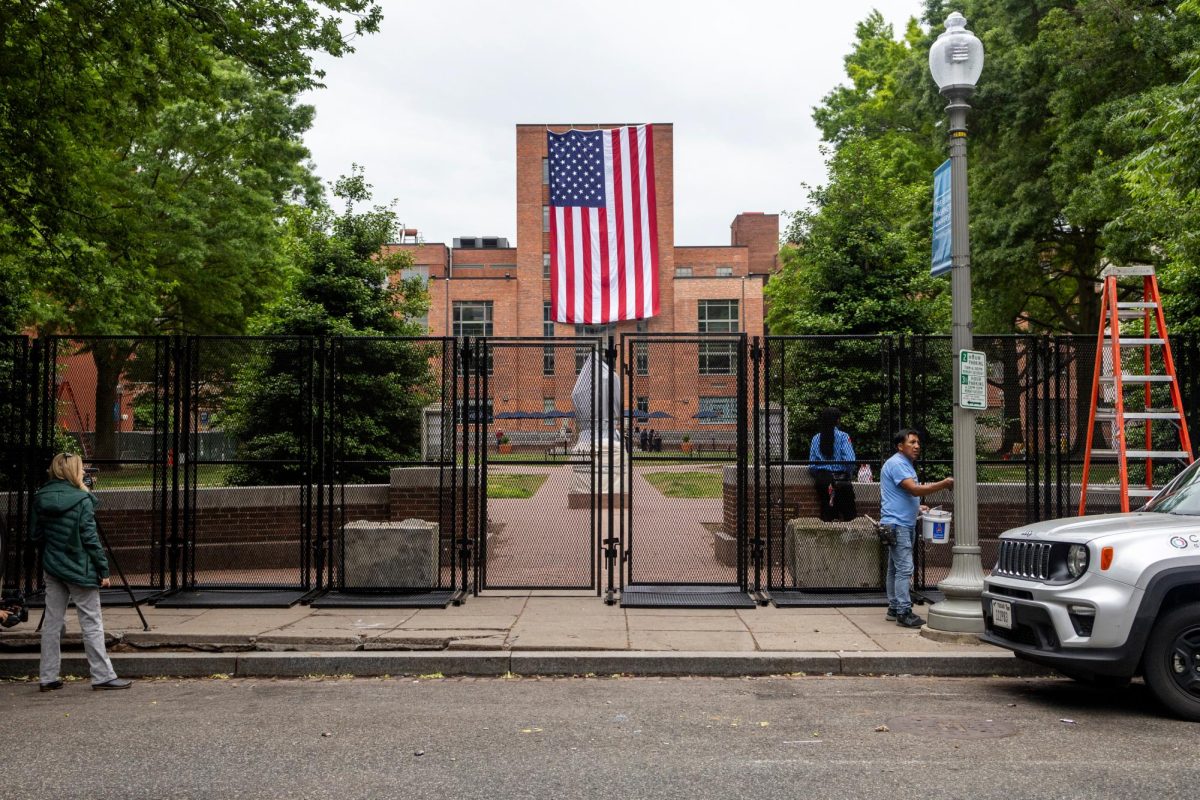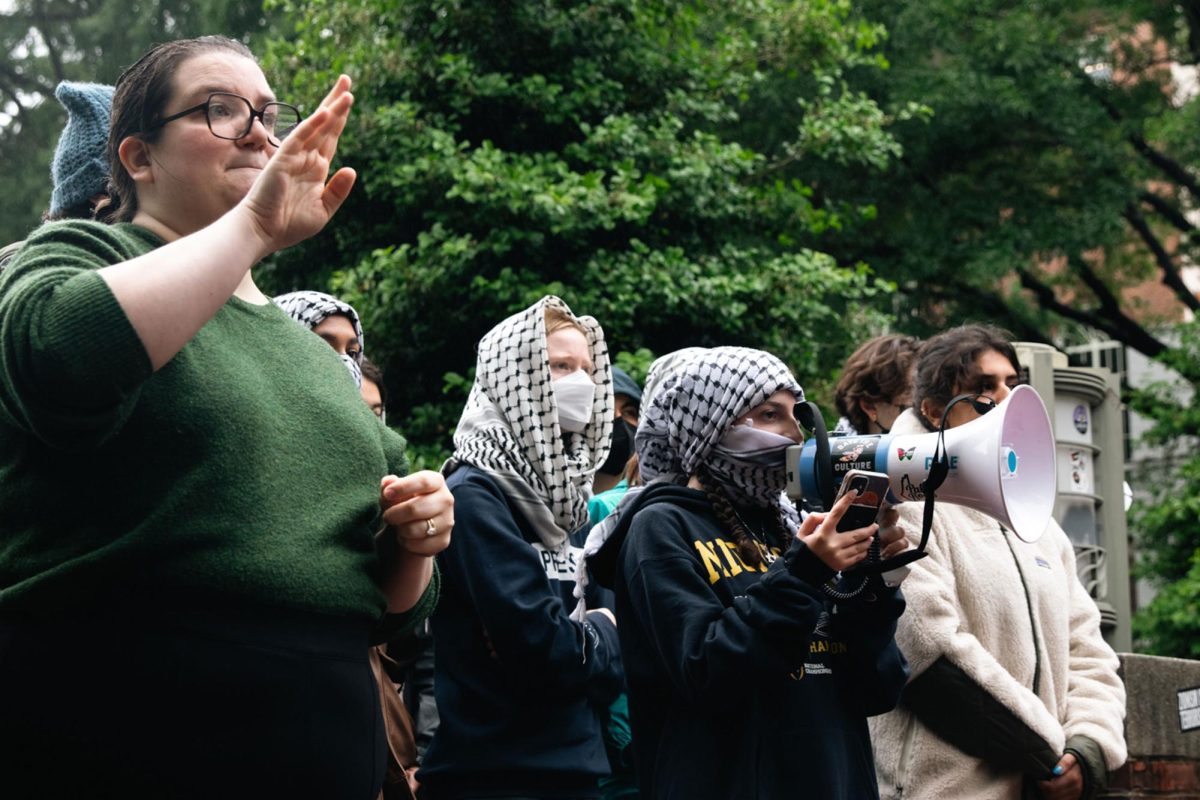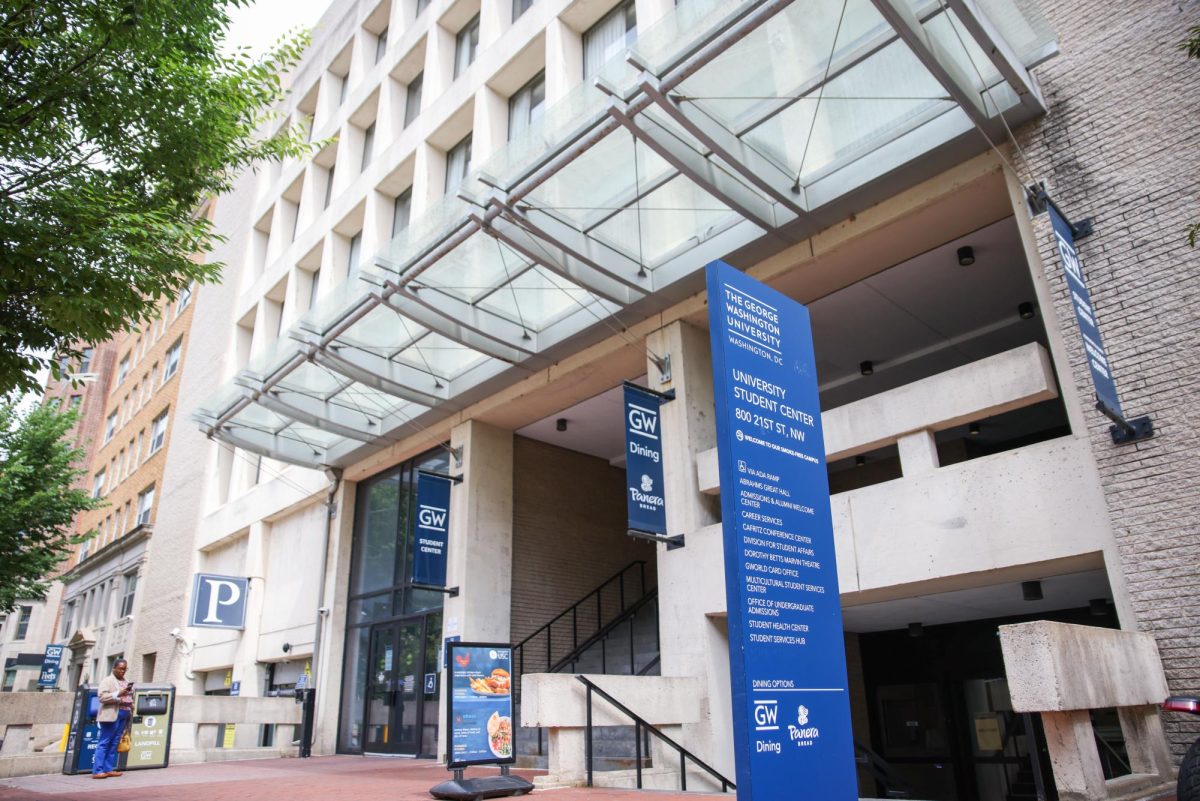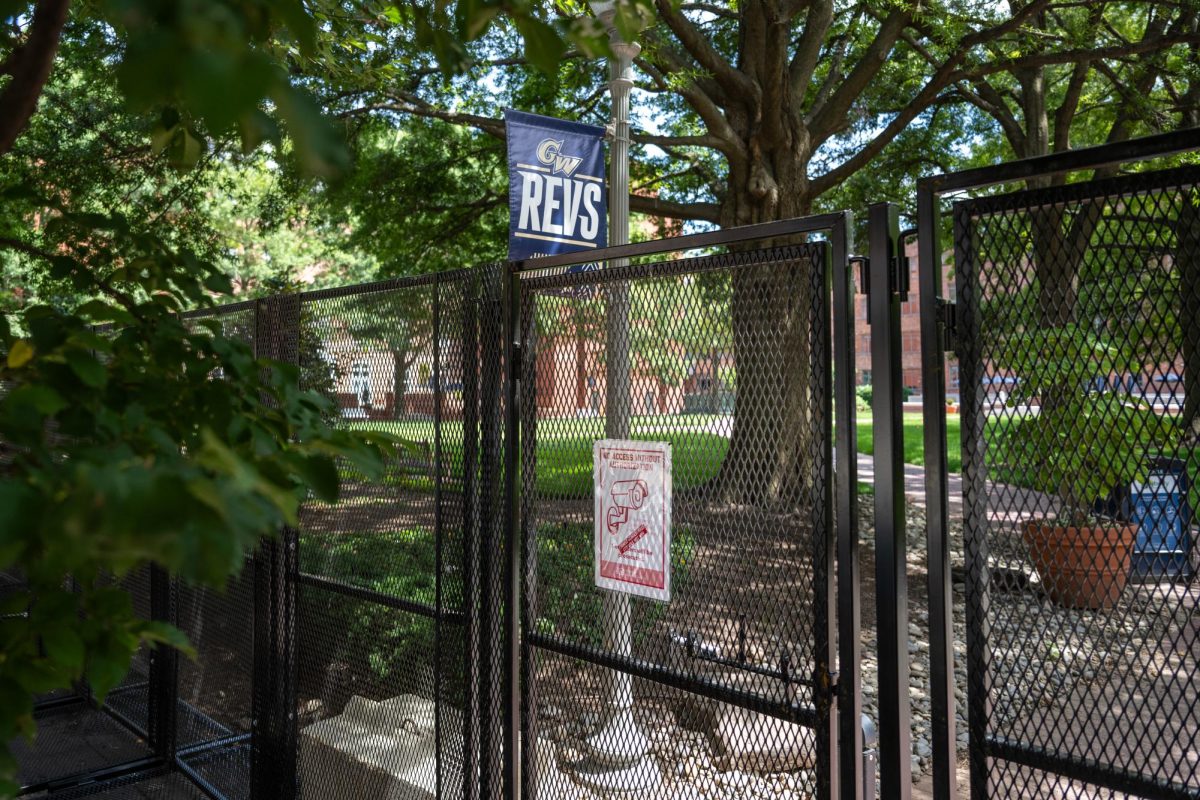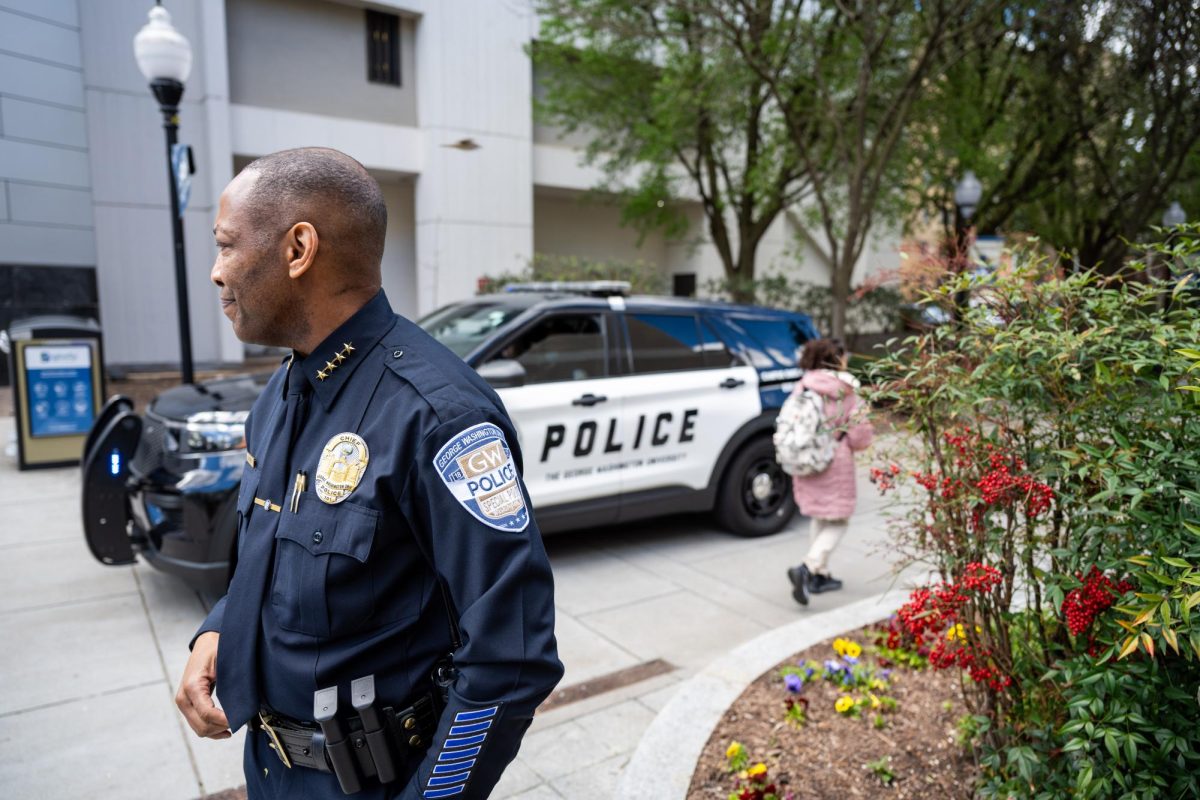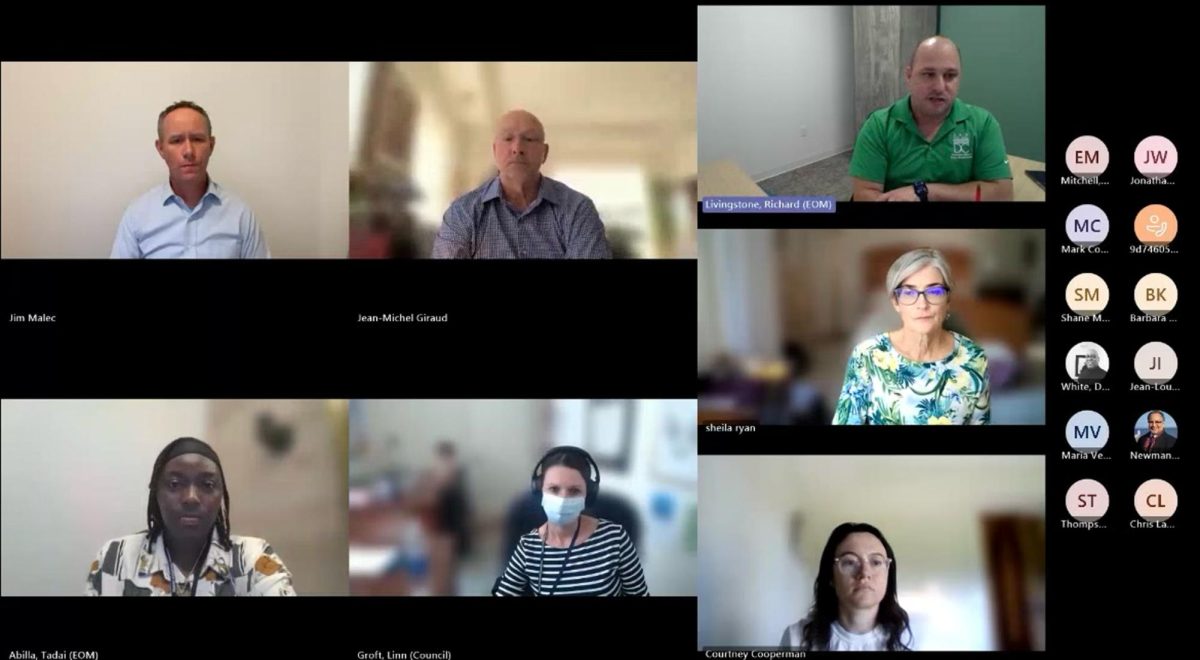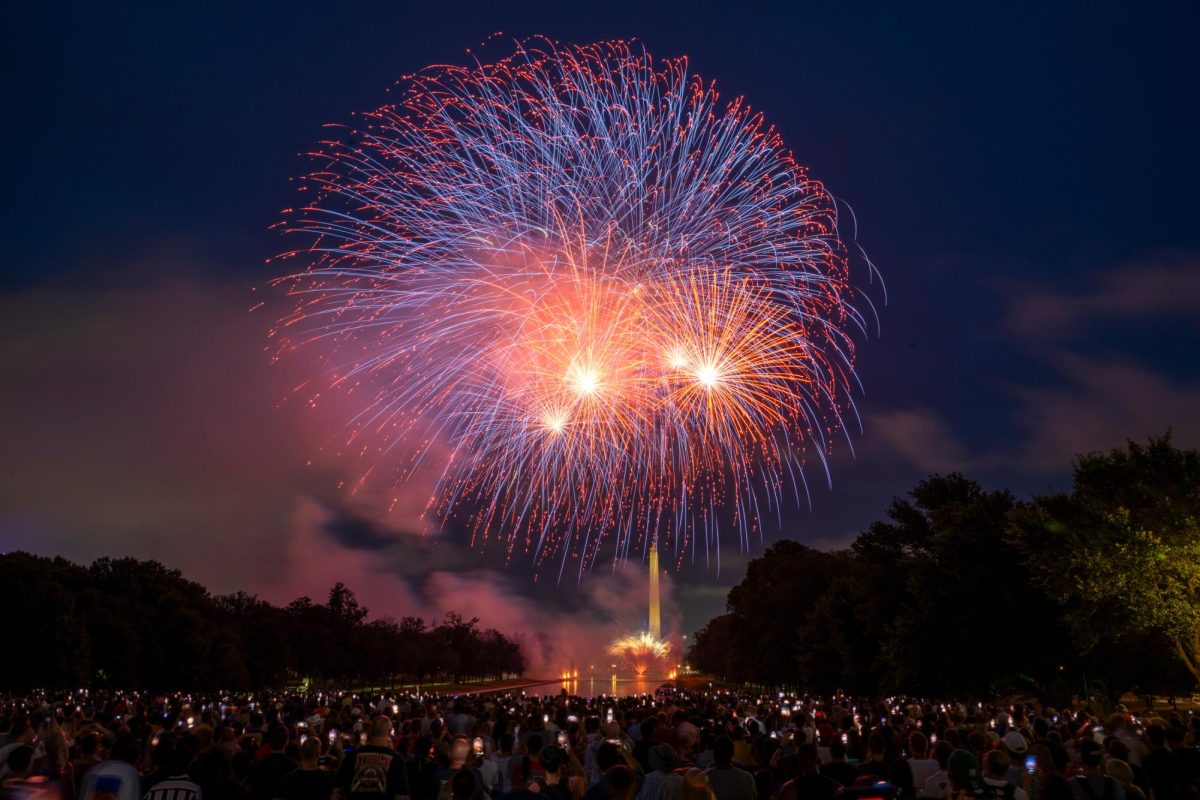After a brief burst in protest in the two days following police’s Wednesday clearing of the pro-Palestinian encampment in University Yard, campus has fallen quiet.
Where U-Yard was once dotted with camping tents, canopies and camping chairs, the lawn is now empty, except for GW Police Department officers and facilities workers occasionally strolling by. Just days before on Wednesday, hundreds of local police had mobilized in U-Yard to clear the tent encampment that occupied the lawn for nearly two weeks to protest the war in Gaza, officers deploying pepper spray and arresting at least six students in the process.
Officials blocked off most central campus spaces, including U-Yard, Kogan Plaza and Anniversary Park behind tall metal barricades as campus entered GWorld Safety Mode, restricting access to University spaces. GW staff also removed the giant American flag that workers hung over U-Yard for days before, an apparent response to demonstrators raising a Palestinian flag on the Lisner Hall flagpole during the protest.
Demonstrators set up an encampment in University Yard for 13 days to demand officials disclose all investments and academic partnerships, drop all charges against pro-Palestinian student organizations and divest from companies supplying arms to Israel. Metropolitan Police Department officers rejected officials’ request to clear the encampment on the second day of demonstrations and continued to decline requests for more than a week because they said the protest remained peaceful.
Just a week away from Commencement, officials brace for an influx of families visiting for graduation and maintain that ceremonies will proceed as normally scheduled — despite a tightening of guidelines prohibiting attendee items like sound devices, posters, banners and flyers. Some universities around the country canceled their graduation celebrations due to safety concerns looming from ongoing campus demonstrations demanding their schools divest from companies aiding Israel’s war on Gaza.
Some campus demonstrations have continued, with hundreds of officers dispersing an impromptu encampment formed by protesters on F Street outside GW offices and University President Ellen Granberg’s on-campus residence Thursday. After a rapid police response of hundreds of officers who issued five warnings to disperse or face arrest, student protesters said they would fall back and “fight another day.” After the protesters dispersed from the police standoff, MPD officers arrested one demonstrator for alleged assault on an officer, but dropped the charges the next morning, according to an Instagram post from the coalition.
Granberg met with student demonstrators on Friday to discuss protesters’ demands, the first conversation with Granberg since protesters assembled the U-Yard encampment. Students live-streamed the sit-down on Instagram as three members tasked with negotiating the coalition’s demands spoke with Granberg and other officials for about an hour and a half.
Dean of Students Colette Coleman initially invited seven student organizations to a 45-minute meeting at 1 p.m. on Friday with Granberg, Provost Chris Bracey and Chief Financial Officer Bruno Fernandes. She said in her invitation that GW wouldn’t consider changes to its endowment investment strategy, academic partnerships or student conduct processes. Organizers rescheduled the meeting to 5 p.m. and said the University showed a “concerning lack of genuine interest” in engaging with students by scheduling the meeting on short notice during Jummah, the obligatory Friday prayer for Muslims, as well as on the final day of exams.
The group also requested that officials exclude Bracey from the conversation because they said he has shown “no regard” for demonstrators’ “safety, well-being and dignity,” repeating their claim that he assaulted two students at the U-Yard encampment, including a member of the encampment’s negotiations team. Bracey was not present at the 5 p.m. meeting.
Granberg said during the meeting that officials won’t commit to financial disclosure or divest from companies selling technology and weapons to Israel, saying that divestment is not as straightforward as protestors believe it to be. She said she hopes to continue conversations with demonstrators to see if there’s “something the institution can do.”
“I hear that from your standpoint, they should be very, very simple,” Granberg said. “They are not, that is not that easy.”
During the meeting, students reaffirmed that part of the intentions of their protests were to seek divestment from institutions with ties to Israel and for the University to disclose its investments.
“Eight students have been suspended, because they seek divestment, financial transparency and the protection of their communities,” an organizer said at the meeting.
The group was unsatisfied with the results and lack of action on their demands at the meeting, but the discussion concluded with the promise of another sit-down with officials Sunday through Zoom. Before the meeting with students Friday, Granberg said at a Faculty Senate meeting she is willing to continue conversations during the summer. Organizers said they’re not interested in “just having meetings” and want results from administrators.
As of Monday morning, there has been no indication that officials have met with student organizers for a second discussion.
“We affirm that despite your commitment to genocide, we will continue to push for all of our demands and we will not rest divest,” a protestor said at a press conference following the meeting.
In the days following MPD’s clearing of the encampment, student protesters claimed officers used excessive force in their sweep, including shoving and kicking protesters and tearing the hijabs of Muslim students. Police have said they are not currently investigating the claims. The Council on American-Islamic Relations condemned what appeared to be workers throwing away prayer mats and translated Qurans after police swept the encampment, which students said they weren’t able to later locate.
The University did not return requests for comment on demonstrators’ allegations that the Metropolitan Police Department used excessive force, including reports that police tore off protesters’ hijabs and allegedly slammed a demonstrator’s head into a bicycle seat hard enough to break their eyeglasses. An MPD spokesperson said Friday morning that MPD was not currently investigating claims of officers ripping off protesters’ hijabs. MPD did not return request for comment regarding claims of an officer hitting a demonstrator’s head against a bicycle seat.
Officials released an unsigned statement hours after the clearing, stating that MPD had conducted a “safe and orderly” operation in clearing the encampment in U-Yard, and Granberg and Bracey said in a statement later that day that they were committed to constructive dialogue and collaboration between faculty, staff, students and administrators.
At least three petitions containing faculty member signatures criticizing GW’s handling of the encampment were circulated online and among faculty, in addition to discussions at a Faculty Senate meeting Friday where senators implored administration to include faculty in major decision-making.
The escalation of police presence and officers’ clearing coincided with Israeli military’s Tuesday seizure of the border of Rafah, a southern city in Gaza, marking an escalation in months of war. More than 35,000 Palestinians have been killed by the Israeli military as of Sunday, and Palestinians in Northern Gaza are suffering from a “full-blown famine,” according to the U.N.
President Joe Biden said he would halt some shipments of American weapons to Israel if Prime Minister Benjamin Netanyahu orders a major military invasion into Rafah. In the same interview, Biden affirmed that he “absolutely” hears the message being escalated on college campuses, where signs, including at the encampment at GW, have labeled him “Genocide Joe,” for sending weapons to Israel.
Padlocks restrict entrances to Anniversary Park and G Street Park, where students swarm on warm spring days. Barricades and caution tape block off shortcuts through Kogan Plaza as security guards sit by entrances, while police cars remain gathered in parking lots. Interim Vice President for Safety and Facilities Baxter Goodly said at the senate meeting Friday that staff would remove “bike racks” surrounding Kogan Plaza so graduating students could take photos, adding that a “defensive barrier” composed of the same metal gates fencing U-Yard would surround the area.
Beyond the patches of yellow grass from the shadows of tents on the lawn of U-Yard, the physical reminders of the student protests over the last two weeks have dwindled since officials cleared the plaza. But small messages of protest remain untouched: signs and spray paint etchings of “Free Palestine” and “Free Gaza” linger on campus sidewalks, signs and elevators.


